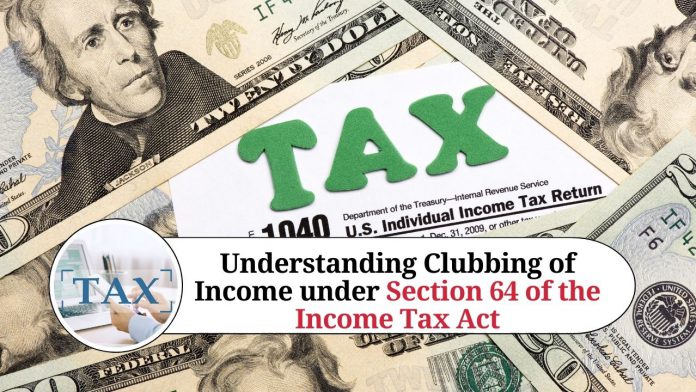Section 64 of the Income Tax Act deals with the clubbing of income. This section specifies the cases where the income of one person is included in the income of another person for taxation purposes.
The clubbing provisions are applicable in cases where a person transfers an asset to his/her spouse or minor child, and the income from such asset is directly or indirectly received by the transferor. In such cases, the income from the asset is included in the income of the transferor for taxation.
For example, if a husband gifts a house property to his wife and the wife earns rental income from the property, the rental income will be clubbed with the husband’s income and taxed accordingly. Similarly, if a father transfers shares to his minor child and the dividends received from those shares are invested by the father, the dividends will be clubbed with the father’s income and taxed accordingly.
Provisions of Clubbing of Income Tax
The clubbing provisions also apply in cases where a person lends money to his/her spouse or minor child at a lower rate of interest than the prevailing market rate. In such cases, the income from the loan is calculated as if it had been charged at the prevailing market rate, and the difference between the actual interest charged and the deemed interest is included in the income of the transferor.
There are certain exceptions to the clubbing provisions specified in Section 64. For example, if the transfer of assets is made in the course of a genuine business or commercial transaction, the income from such assets will not be clubbed. Similarly, if the spouse or minor child has earned income from his/her skill or profession, such income will not be clubbed with the income of the transferor.
Importance Of Clubbing Of Income
Taxpayers need to be aware of the clubbing provisions specified in Section 64 of the Income Tax Act to avoid any unintended tax liabilities. Taxpayers should seek professional advice in case of any doubts or clarifications regarding the clubbing provisions.
In addition to the situations mentioned above, Section 64 also specifies that income arising from assets transferred to a person or an association of persons (AOP) in which the transferor has a substantial interest may be clubbed with the income of the transferor. A person is considered to have a substantial interest if he/she holds 20% or more of the capital or profits of the AOP.
For instance, if a person transfers an asset to an AOP in which he/she holds a substantial interest and the income from that asset is received by the AOP, then the income will be clubbed with the income of the transferor. This provision aims to prevent taxpayers from circumventing the clubbing provisions by transferring assets to entities in which they hold a substantial interest.
Final Conclusion
Clubbing of income applies not only to individuals but also to Hindu Undivided Families (HUFs). The provisions of Section 64 also apply to HUFs and income from assets transferred by the HUF to its members may be clubbed with the income of the HUF.
Read more useful content:
- section 145 of income tax act
- section 10e of income tax act
- section 9 of the income tax act
- section 94b of income tax act
- section 206aa of income tax act
Here are some frequently asked questions (FAQs) about Section 64 of the Income Tax Act:
Q: What is the clubbing of income under Section 64 of the Income Tax Act?
A: Clubbing of income refers to the inclusion of the income of one person in the income of another person for tax purposes. Section 64 specifies the cases where such clubbing of income is applicable.
Q: Who is liable to pay tax on the clubbed income?
A: The person who transfers the asset to his/her spouse or minor child is liable to pay tax on the clubbed income.
Q: Are there any exceptions to the clubbing provisions under Section 64?
A: Yes, there are certain exceptions to the clubbing provisions specified in Section 64. For example, if the transfer of assets is made in the course of a genuine business or commercial transaction, the income from such assets will not be clubbed.
Q: Does clubbing of income apply to Hindu Undivided Families (HUFs)?
A: Yes, clubbing of income provisions also applies to HUFs. Income from assets transferred by the HUF to its members may be clubbed with the income of the HUF.
Q: What are the penalties for non-compliance with the clubbing provisions under Section 64?
A: Non-compliance with the clubbing provisions under Section 64 can lead to penalties, including interest and penalty charges. Additionally, the taxpayer may be required to pay back taxes owed, along with any fines or penalties assessed.
Q: Can a taxpayer avoid clubbing of income by transferring assets to an AOP?
A: No, clubbing of income provisions also applies to AOPs in which the transferor has a substantial interest. If the income from assets transferred to the AOP is received by the AOP, it may be clubbed with the income of the transferor.




















